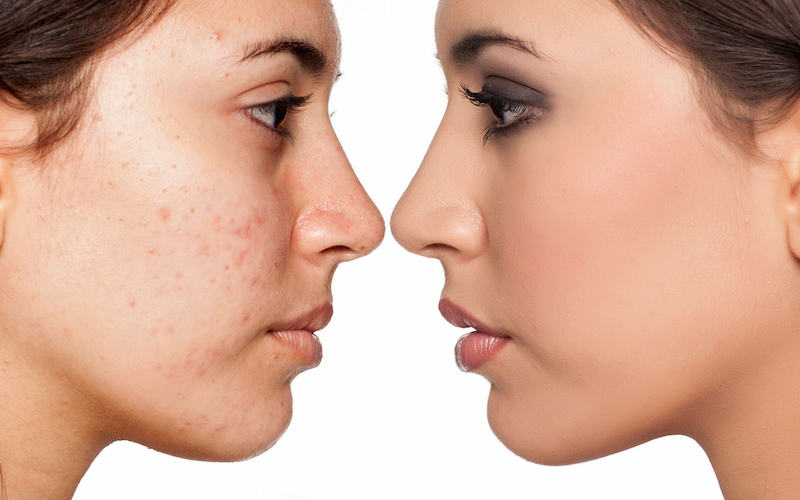There is nothing more worrisome about beauty problems for teenagers and youngsters than acne. If not treated at the right time with the right approach, it can worsen, resulting in acne scars/marks that will remain on the face for a long time, affecting our self-confidence.
Do you know that acne, an inflammatory skin condition, is seen among 85% of Teenagers in the US, which is around 3 in every four people? That is almost 40 million to 50 million in numbers!
Shocking, right?
In Functional Medicine, we have developed an effective, comprehensive, and non-painful approach to overcome this inflammatory disease, starting with the basics of achieving health and well-being, your skin is simply a reflection of that.
What is Acne?
Acne is a complex skin condition where pores often get blocked by sebum, hair follicle, dead skin cells, and bacteria, leading to the formation of whiteheads, blackheads, and pimples on the face, shoulder, back, neck, and arms.
Acne is believed to develop as a result of increased sebum production, inflammatory mediators, and keratinization of the pilosebaceous duct.
Teenagers and young adults between the ages of 11 and 25 are the age groups most likely to have acne.
What Causes Acne?
Several factors cause the development of acne:
- Hormonal changes/Hormonal
- Acne
- Diet
- Excess of sebum production
- Stress
- Lack of exercise
- Microorganisms
- Genetics
Do Microbes Cause Acne?
Yes, it does. Studies have shown that the microorganisms from the skin and gut influence the development of acne. Let’s get into the details:
Microbes of Skin:
Studies have shown that the microbes such as Cutibacterium acnes (previously named propionibacterium), Staphylococcus Epidermidis, and Malassezia (fungi) are commensal skin bacteria that are an essential part of human health as they act as a barrier against pathogens, maintain low Ph of skin and modify host immunity. However, dysbiosis is thought to aggravate skin disease.
For a long time, it was believed that acne was caused due to overgrowth of C. acnes associated with increased levels of sebum production and extrinsic environment factors during teenage and young adult years. However, the pathophysiology is unclear.
The complexity of microbes differs from person to person and changes with age. Dysbiosis of these microbes will lead to chronic inflammation of the skin and the development of acne.
Skin-Gut Axis:
The relationship between skin and gut health is complex and intertwined.
The healthy microbes of the skin and gut work together called a skin-gut axis, and these microbes, at an optimal level, act as a barrier against external agents and protects the host body.
This axis is triggered by increased blood sugar levels, stress levels, hormonal changes, and certain other toxic bacteria leading to the development of skin disease.
Gut-Microbes Relation to Acne
Your gut consists of trillions of microbes, mainly bacteria, and fungi; when your gut microbiome is balanced, it can maintain a healthy intestinal barrier. This intestinal barrier prevents harmful toxins from entering your blood streams.
Whenever your intestinal barrier is damaged due to gut dysbiosis, it allows passage of harmful toxins and some molecules (pro-inflammatory factors) from the small intestine to the bloodstream, and this condition is known as Leaky -gut.
A leaky gut causes inflammation in the body and results in chronic inflammation of the skin, redness, and acne.
Does Western-Diet Cause Acne?
In America and other countries, the western diet is in trend. This diet consists of dairy products, saturated fat, sugar, processed food, and drinks like soda.
According to some studies, diet alone can play a major role in the development of acne, especially the western diet with high dairy and glycemic index (GI) food items.
Previously it was thought that acnes are Androgen dependent, but recent studies have proved that serum levels of insulin-like growth factor (IGF-1) play an important role in acne pathogenesis.
Rapamycin complex 1 (mTORC1) is a complex protein that helps maintain metabolism and regulates cellular processes like protein synthesis to Autophagy.
Any alteration in the function of mTORC1 may affect certain important biological processes in the body leading to Acne, Cancer, and Diabetes. Don’t worry. We have a functional medicine approach to acne to help you.
Treatment of Acne Through a Standard Approach
Dermatologists commonly recommend topical therapy as a standard of care for mild to moderate acne. Retinoids and antimicrobials are the mainstays of topical acne therapy.
Retinoids such as tazarotene, adapalene, and tretinoin act by follicular blockage but have side effects like irritation.
Benzoyl peroxide is a fast-acting bactericidal agent that prevents the resistance of bacteria to antibiotic therapy and has anti-inflammatory properties.
It is available in various topical preparations, but the major side effect is it has a potent bleaching reaction.
So, what to do now? Is there an effective treatment plan with no or minimum side effects? Yes, there is- a functional medicine approach to acne.
Acne and Functional Medicine
At first, we will perform various tests which focus on the gut, urine, blood, and stools of patients to rule out the main cause. We also check hormonal levels in the body to rule out hormonal acne, and diet history is taken down of a patient to eliminate a few foods which are contributing to acne.
This approach will identify the root cause of acne and design an appropriate and comprehensive treatment plan. Because at Functional Medicine Center Atlanta, we are guided by the patient and not by the disease!






